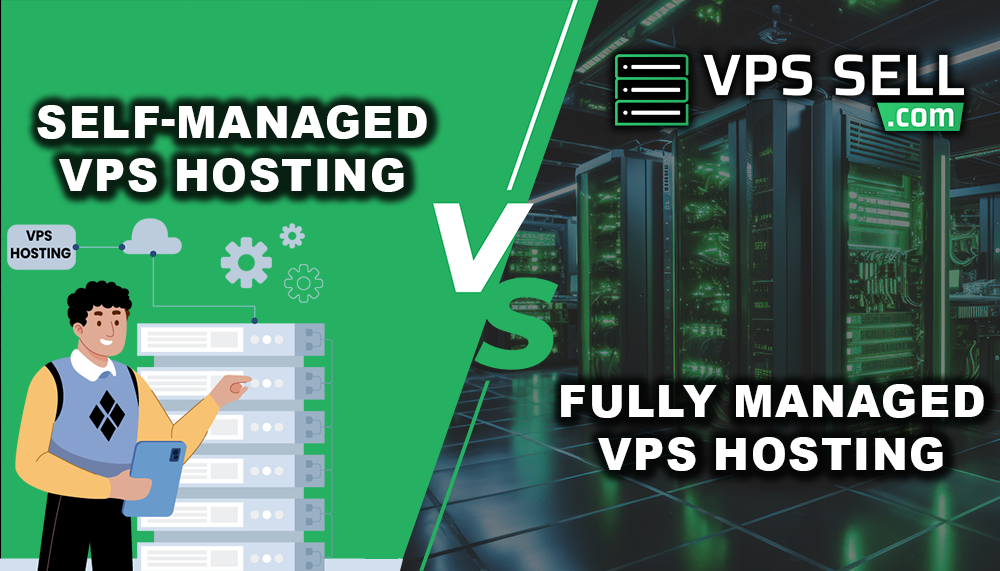
Self-Managed vs. Fully Managed VPS Hosting
One important decision you will be considering in choosing Virtual Private Server hosting is between self-managed and fully managed VPS hosting . While these options offer some different advantages, what really suits your needs best depends on your technical skills, project requirements, and budget. In this tutorial learn what the differences are, so that you will be able to choose what suits your needs best.
What is VPS Hosting?
VPS hosting provides the perfect powerhouse for websites that have grown beyond shared hosting but aren't quite big enough to need a dedicated server. It enables one to find middle ground by having a private and isolated environment on a shared physical server. You will be in a position to access independent resources such as CPU, RAM, and storage. This, in turn, amounts to better performance, greater flexibility, and more control compared to shared hosting.
Understanding Self-Managed VPS Hosting
In Self-managed VPS, full control of the server is in your hands. You manage everything from installing software, updating, and installing security patches to configuring the server. The hosting providers give you only the tool and the environment, leaving all the technical management up to you.
For Whom Self-Managed VPS?
Self-managed VPS hosting will work for users with rich technical backgrounds. Whether you are a developer, a system administrator, or just an enthusiast who likes having full control over every single aspect of your server environment, this option is great for you. You can install any software you want, configure the server the way you want it, and will enjoy full root access to your server.
Advantages and Disadvantages of Self-Managed VPS Hosting
Pros:
- Full control: Configure the server the way you want.
- Cost-effective: Since you do all the managing, then it will also be relatively cheaper.
Cons:
- Time-consuming: Server management requires a lot of attention continuously.
- Technical knowledge is required: You must feel comfortable doing server administration activities like troubleshooting, updating, security, among others.
Understand What Fully Managed VPS Hosting Means
With the fully managed VPS, the hosting provider will take care of all the technical aspects for you. That would include all software updates, security patches, server monitoring, backups, and optimization of its performance. You don't need to worry about the maintenance of your server because everything is looked after by a team of experts.
For Whom the Fully Managed VPS?
Full-Managed VPS hosting allows business owners and other non-technical users to get deep into running their websites or businesses without the nagging headache of server management. In this system, you get peace of mind in case your project requires high availability but you lack technical skills and time needed to manage the server.
Advantages and Disadvantages of Fully Managed VPS Hosting
Pros:
- Less headache: It's all taken care of by the provider, so you may focus on your business.
- Increased security: The security for Managed is oftentimes much better.
- 24/7 support: You receive professional assistance if, and when, anything goes wrong.
Cons:
- Increased cost: Your VPS will surely cost more due to all the added services included.
- Less Control: You are not as free to make changes to deeper system and/or customizations.
Cost Comparison: Self-Managed versus Fully Managed VPS
Another important consideration in choosing between self-managed and fully managed VPS hosting is price. Since you are going to assume all the responsibilities of the server, self-managed VPS tends to come at much lower rates. The rates of managed VPS go a little higher, since added services such as monitoring, backup, and security will be given to you for a real hassle-free experience worth every penny, especially to those people who know next to nothing about technical stuff.
Performance and Security Considerations
All in all, the performance is excellent with both self-managed and fully managed VPSs, while resources are dedicated. In self-managed VPS, you will be responsible for keeping your running server at an optimum level. While in managed VPS, on the other side, providers involve automated performance optimization and increased security protocols like frequent updates and firewall configuration, malware scans, so that server would remain safe and fast without your interference.
How to Choose between Self-Managed and Fully Managed VPS

In conclusion, your decision about either self-managed or fully managed VPS rests in your technical capability, time, and budget. If you are confident enough to run a server, then self-managed VPS can give you full control while enabling you to cut much in price. But for those who need to dedicate all their time and attention to their business or project, and do not want to bother with the technical stuff of running a server, then yes, surely it is safer and more convenient to have a fully managed VPS.
Self-managed and fully managed VPS hosting are both good in their own right. If your main issues are full control, personalization, and economy, then what you need is self-managed VPS. If ease of use and security without too many headaches is what you want, take the direction of fully managed VPS. Understand your needs, and that will help you decide appropriately for your website or business.